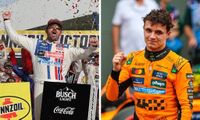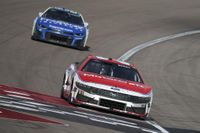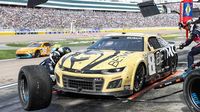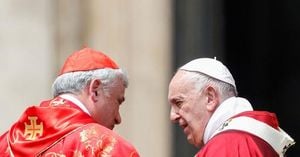The NASCAR scene exploded with excitement at the Las Vegas Motor Speedway over the weekend, particularly during the 2025 Pennzoil 400, which showcased fierce competition and led to notable viewer engagement. The race on March 16, 2025, proved to be an electrifying affair, crowned by Josh Berry's victory, marking his first career win in the NASCAR Cup Series.
The day started with Austin Cindric and Kyle Larson demonstrating tactical prowess by winning the first two stages. Their strategies set the tone for the final stage, where tension mounted as the race approached its climax. As the laps dwindled, Daniel Suarez seemed poised to break a controversial winless streak; however, in a twist of fate, Berry managed a dramatic pass to clinch his inaugural Cup Series victory.
"Winning at Vegas means the world to me and my team," Berry stated post-race, expressing his gratitude towards the crew and fans. Not only did this win signify a personal milestone, but it also relegated Suarez to another near-miss as he continues searching for a breakthrough.
The competitive spirit extended to the TV ratings, where NASCAR attracted an impressive audience. The race averaged 3.011 million viewers on FOX Sports 1, marking it as the most-watched NASCAR event in the NextGen car era, eclipsing previous records and establishing a momentum boost for the season. Comparing figures, this audience surpassed the previous week’s average of 2.82 million viewers during the race at Phoenix and marked a notable improvement from the last Las Vegas event in 2024, which had aired on network television, drawing in 4.36 million viewers.
However, amidst the success on the track, NASCAR also faced challenges off it. The organization issued suspensions impacting two teams, further emphasizing the importance of team discipline within the sport. On March 19, NASCAR suspended two crew members each from the Kyle Busch and Chase Briscoe teams due to safety violations that saw tires become detached during the race. As a safety precaution, NASCAR's rules allowed for swift action: jackman Joseph Moser and rear tire changer Shiloh Windsor from Busch's team, alongside jackman Caleb Dirks and rear tire changer Daniel Smith from Briscoe's crew, will be out for the upcoming races.
This situation hinged on strict regulations set by NASCAR to ensure the safety of drivers and crew alike during high-stakes events. The suspensions raise questions about structural team efficiency, as crew integrity directly affects race outcomes and overall team performance.
NASCAR's stringent assessments are not restricted to the Cup Series; repercussions were also felt in the Xfinity and Craftsman Truck Series, as multiple teams were fined for failing to secure lug nuts, a critical safety component. Four teams in the Xfinity Series—Kaulig Racing, Joe Gibbs Racing, Sam Hunt Racing, and JR Motorsports—each received a $5,000 penalty, while another team from the Craftsman Truck Series was fined $2,500.
With NASCAR ramping up excitement with back-to-back events, the upcoming weekend at Homestead-Miami Speedway will be closely watched. The sixth race of the NASCAR Cup Series season is scheduled for March 23, 2025, and expectations are building among fans and sponsors alike. As the series gains traction, maintaining integrity and teamwork remains crucial to sustaining its reputation.
In contrast to NASCAR’s fluctuating numbers, Formula 1 has heralded impressive viewership results. The recent Australian Grand Prix recorded 1.1 million viewers, reflecting a steady growth in interest for the sport in the U.S. This was part of an overall trend as the Formula One races have consistently captured a growing audience, possibly challenging NASCAR for the viewer's loyalty, particularly among younger demographics.
For context, the Cup Series currently enjoys an average viewership of 4.06 million year-to-date, slightly up from 4.04 million last year. Nevertheless, comparisons for specific race events reveal a downward trajectory—significant for NASCAR, which is generally known for its larger audiences during the early season. The fact that the figures have begun to reflect slight declines raises eyebrows, particularly among marketing strategists and sponsors.
In recap, NASCAR’s position in motorsport remains robust, but examining strategies for engagement and viewership maintenance will be pivotal as the season progresses. It will be fascinating to see if teams can turn recent challenges into learning experiences, ensuring they are prepared for the races ahead.
As fans stay tuned for more high-octane racing action, the saga of success, challenges, and evolving narratives in NASCAR continues to unfold, making it a captivating chapter in American sports history.






